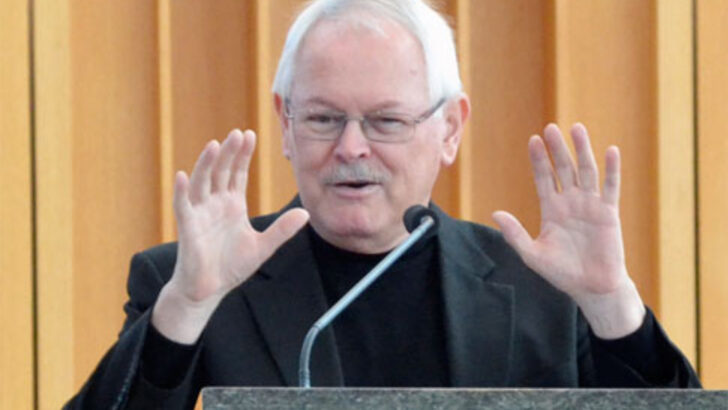Garry O’Sullivan sat down with columnist and retreat giver Fr Ron Rolheiser and asked him about Catholics and the reading of scripture.
G: Often people see some of the things you say somehow against Church teaching, is there a problem for many Catholics in their reading and understanding of the bible?
Fr Rolheiser: I came from that background. I grew up a very pious Catholic, memorised the Baltimore Catechism where you worry about anything that doesn’t fit catechetically, so where I get on a lot of push back on is safe dogmatic things, to say ‘God isn’t a man’.
God is ineffable, God is as much woman as man and so on. But like I said at the talk that God didn’t want Jesus to die like that. God didn’t want Jesus to really suffer. For God it would have been good enough for Jesus, dying of old age, dying in bed with people, holding his hand, singing the Salve Regina.
G: People would come back to you especially on taking the stories of the Gospel literally, were they taught to take them literally?
Fr Rolheiser: That’s complex, but very important. See, when you take stuff literary, like in the Old Testament, some of the stories literally are horrifying stories, they literally kill everybody. But even in the New Testament in Ephesians, Paul – we think Paul wrote Ephesians – says, “Women be subject to your husbands.” Well, is that meant to be taken literally? People say yes/no. In the same epistle at the end of that, Ephesians, Paul says, ‘In Christ… everybody is equal.’
The Bible is normative. But not every line is normative. Jesus says, “preach from the housetops” – have you ever done that? – or “call nobody your father.” “You got to hate your father and mother,” and so on. Incidentally, in that same epistle where Paul says women be subject to husband, he said, slaves be subject to your masters.
Read the overall book and see Paul says, be subject to your husbands, be subject to your masters. And then he ends the thing with a Christian license. But in Jesus Christ everybody’s equal.
The danger of reading lines literally, fundamentalism, is it just strips scripture of its richness. But those texts are just powerful texts. The Old Testament, if you take that text literally, they kill everybody. First, it’s awful, but there’s no lesson to it if you take it, in its meaning. I tell people, it makes a great text for marriage. You’re getting married, you need to kill the old Canaanites, all your old boyfriends and girlfriends.
If you take them into your marriage, you’re going to ruin your marriage. When you move into the promised land, you can’t take the old with you, or it’s going to ruin the new. That’s the richness of the text. If you take it literally, you don’t get that, you get the wrong message.
You miss the point of the texts. All those texts are there for a reason. In scripture every line needs to be in there. And then it gets tricky because sometimes in the new testament there is a literal point. Sometimes you have to take it literally and other times not. That’s why you have to study in seminary. You study scripture for 4 or 5 years to get some sense of it.
G: Have we been Creed Catholics? Do we need to understand Jesus better?
Fr Rolheiser: We all have our own take on Jesus. But the wider Christ escapes us. There’s always more. To our credit, we get a lot of stuff right. But also, there’s a lot that can make us narrow. Like saying ‘Protestants can’t go to heaven’. The word Catholic means universal, we sometimes forget that. That means everybody. Jesus is there for everybody, which includes Buddhists and Protestants.
In Scripture when Joseph and Mary found the 12-year-old Jesus in the temple, he says to him, didn’t you know I need to be about my father’s business. He wasn’t just saying some snappy answer to his mother.
Jesus is still telling us he is about his father’s business, which means I’m your kid. But he’s an uncontrollable kid, as Mary found out. ‘I’m doing stuff that you can’t understand.’ He’s still doing that in world religions all over, in atheism and paganism and so on.
You know, and see that that’s where as Christians, we have to stretch ourselves, we still control Jesus. He’s our kid. He better stay within our boundaries.
The more I live in life, the more I realise that Christ is ‘the universal Christ’.


 Fr Ron Rolheiser
Fr Ron Rolheiser